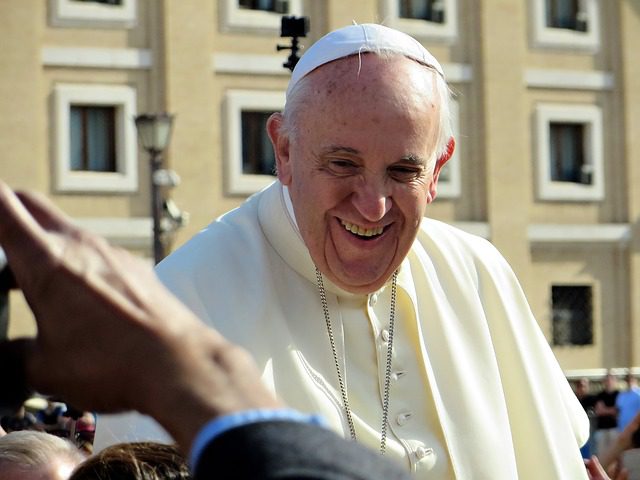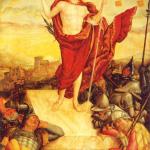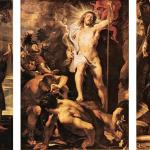An Italian journalist has quoted Pope Francis as saying “there is no hell,” a statement that the Vatican quickly backtracked, referencing an admission by the journalist that his interviews employs “reconstructions” of conversations. But questions remain, including questions about the nature of the papacy.
Here is what happened. From Michael W. Chapman, Pope Francis: ‘There Is No Hell’:
In another interview with his longtime atheist friend, Eugenio Scalfari, Pope Francis claims that Hell does not exist and that condemned souls just “disappear.” This is a denial of the 2,000-year-old teaching of the Catholic Church about the reality of Hell and the eternal existence of the soul.
The interview between Scalfari and the Pope was published March 28, 2018 in La Repubblica. The relevant section on Hell was translated by the highly respected web log, Rorate Caeli.
The interview is headlined, “The Pope: It is an honor to be called revolutionary.” (Il Papa: “È un onore essere chiamato rivoluzionario.”)
Scalfari says to the Pope, “Your Holiness, in our previous meeting you told me that our species will disappear in a certain moment and that God, still out of his creative force, will create new species. You have never spoken to me about the souls who died in sin and will go to hell to suffer it for eternity. You have however spoken to me of good souls, admitted to the contemplation of God. But what about bad souls? Where are they punished?”
Pope Francis says, “They are not punished, those who repent obtain the forgiveness of God and enter the rank of souls who contemplate him, but those who do not repent and cannot therefore be forgiven disappear. There is no hell, there is the disappearance of sinful souls.”
This contradicts two thousand years of church teaching, the pronouncements of numerous other popes, all of the authoritative theologians who have been named Doctors of the Church, and the current catechism, all of whose unanimous testimony is that Hell exists as a realm of eternal conscious punishment.
Soon the Pope’s handlers in the Vatican released this statement:
“The Holy Father Francis recently received the founder of the newspaper La Repubblica in a private meeting on the occasion of Easter, without however giving him any interviews. What is reported by the author in today’s article [in La Repubblica] is the result of his reconstruction, in which the textual words pronounced by the Pope are not quoted. No quotation of the aforementioned article must therefore be considered as a faithful transcription of the words of the Holy Father.”
Indeed, the journalist Scalfari has admitted that he never takes notes or makes a recording of interviews and that he employs “reconstructions” of what his subjects tell him. An earlier story by Scalifari about a conversation with the Pope also created a stir when the pontiff was quoted as saying that efforts to convert people to Christianity were “solemn nonsense.” The Vatican backtracked that statement too.
Pope Francis has previously warned people about going to Hell, and, presumably, the demons whose exorcisms he is always recommending have to live somewhere. So let’s assume that the Pope does believe Hell exists and that the journalist’s reconstruction was incorrect.
Still, the question remains, what did the Pope say–in both conversations–to give Scalifari the impression that was the basis of his “reconstruction”?
I suspect that the Pope was trying to persuade his atheist friend to accept Christianity (“solemn nonsense” or not), and that he fell into the pattern that many people do in those kinds of conversations of softening the hard edges of the faith in an effort to make it easier to accept.
In any event, he was not speaking ex cathedra, so technically he was not using his alleged infallibility.
But the controversy illustrates one of the problems with the institution of the papacy. Catholic apologists say that having a living, breathing source of theological authority protects the church’s teachings. But surely having such an authority makes doctrinal innovation possible. The Orthodox are bound by Holy Tradition and purport to change nothing, and the Bible doesn’t change for Protestants, though interpretations and applications may. Catholicism, though, has a mechanism for introducing completely new doctrines into Christianity. And it has done so throughout church history (e.g., purgatory, indulgences, the cult of the saints, papal infallibility, the Immaculate Conception of the Virgin Mary, her Ascension, etc.).
Pope Francis could declare that Hell does not exist. More precisely, he could proclaim an annihilationist view of divine punishment. He could define Hell as “eternal death,” which he could define in terms reported by the journalist, as “the disappearance of sinful souls.” Such an understanding has been adopted by certain Protestant theologians and sects such as the Adventists. (Read this account of annihilationism.)
But if Pope Francis used his authority to make this the Catholic position, it would still contradict centuries of Catholic teaching. Which would undermine the authority of other popes. Which would also undermine his authority to change the teaching! And in dismissing the teachings of Augustine, Aquinas, and church councils, that would undermine the authority of the magisterium of the Catholic church.
The papacy would thus prove to be a highly destabilizing institution and Roman Catholicism itself would be in jeopardy.
So, if the papacy is to function, the Pope needs to take great care in what he says. Especially when talking to journalists.
Photo by Günther Simmermacher via Pixabay, CC0, Creative Commons














